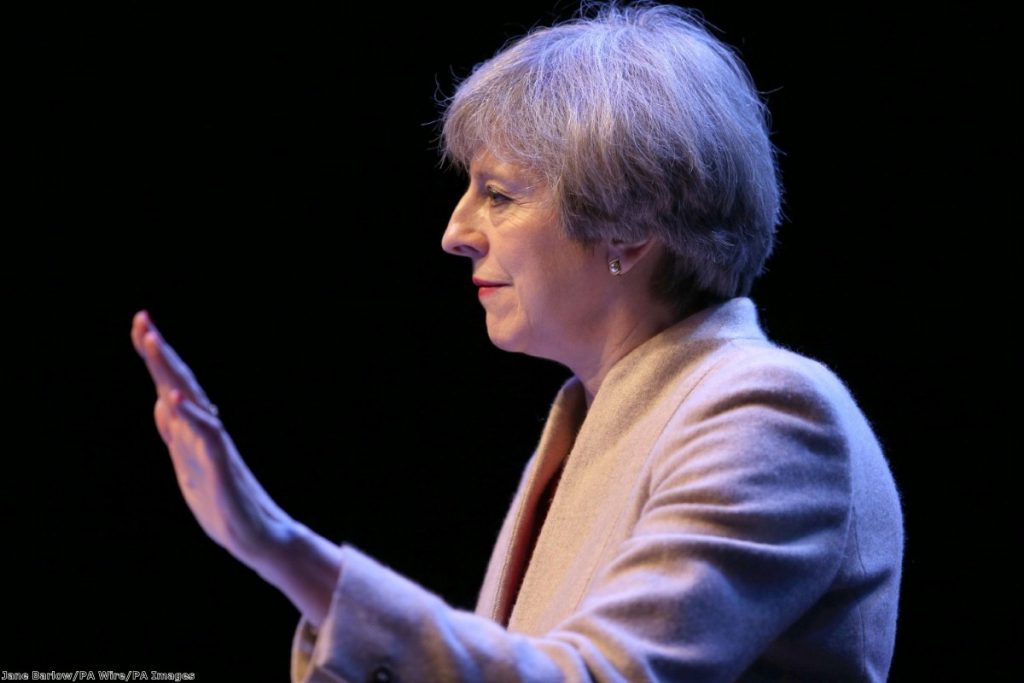Bad week for the Tories. On Monday, Nicola Sturgeon announced plans for a second independence referendum, sabotaging plans to trigger Article 50 and creating a pounding new headache for Theresa May to deal with during the EU negotiations. The Electoral Commission then fined the party £70,000 over "significant" election campaign expenses issues and referred one matter involving the party's treasurer to the police. But the centrepiece of its troubles was the U-turn over Philip Hammond's Budget.
The Budget only really had one policy in it – national insurance changes for the self-employed. It was a pretty minor change but it triggered a spasm of anger from the right-wing press and some Tory backbenchers. The latter are becoming increasingly adept at flexing their muscles, whether over this, or business rates, or child refugees, or sex education, or the school funding formula. Someone somewhere has to provide opposition and it certainly isn't going to be Jeremy Corbyn, so it might as well be them.
The Budget U-turn says a lot about where power lies – in Fleet Street and to a more limited extent the Tory backbenches. It also says something about the inability of British political parties to deal realistically with national finances. But it also, if you peer a little closer, says something important about how Theresa May conducts herself and treats those around her.


The chancellor was subject to some spectacularly brutal briefings in the blink-and-you'll-miss-it period between his announcement of the policy and the U-turn on it. According to the press, May had told him she didn't care how bad it was for him, she had put him on probation, she had strong-armed him into the U-turn, she had punished him, his credibility was in tatters, he had shown a staggering lack of basic political competence, he was humiliated. You can take a guess at where these comments originated. The word 'humiliated' played over and over again. Partly this was press glee at the humbling of a critic of the hard Brexit policy. Partly it came from the strength of the briefings against him.
It's not the first time the hallways of No.11 have witnessed the humbling of a chancellor, even in the last few months. Hammond's predecessor, George Osborne, was invited into Downing Street for a dressing down before being sent packing when May took over. He now hovers around political circles, occasionally on the backbenches, occasionally having lunch with journalists. He is the subject of numerous rumours about how he will challenge May when she is at her weakest or, more likely, use a stalking horse to do so. Time is on his side. At the end of the next parliament, in 2025, he will still be younger than May is now. May's approach created a powerful enemy storing up resentment for when she is in a more vulnerable position.
For the time being, he is the shock new editor of the Evening Standard. Throughout Article 50, May now has an enemy heading the capital's main newspaper and able to prioritise stories about the effects of Brexit on financial services to its influential readership. This is the danger of enemy-creation. The satisfaction fades, but the enemy lasts.

The treatment of Hammond is similar and doesn't even make sense on its own terms. May's response to the crisis allows for only three possibilities: She is either irrelevant or weak or cruel. If Hammond had not shown her the main policy in the Budget before delivering it, she is irrelevant. If he had and she objected but he delivered it anyway, she is weak. If he had and she backed him and then turned against him once the backlash started, she is cruel.
These are the only options.
Ministers have emphasised option two – telling journalists that No.10 objected to the policy before it was announced but that Hammond pressed ahead anyway. The more realistic option is number three.
The process was made as bruising as possible. First May announced a one-year delay to the policy. That was bad enough. Then they announced a full U-turn. Hammond was forced back to the Commons, chastened, his name being dragged through the mud of the national press. It was a particularly cruel treatment of a man who, whatever you thought of the move, had simply introduced a modest change designed to expand the tax base as more people drifted into self-employment.
For now, May emerges knocked back but still retaining her relationship with the right-wing press. She sells herself as the sturdy prime minister, but at the first sign of trouble from them, she folds like a deck chair. Because she is so servile, they then help sell her image as a sturdy prime minister. And so the cycle continues, although this episode offers a troubling hint of how she will behave during Brexit negotiations and which domestic forces she is most likely to listen to.
Hammond is in a different place. The hounds of hell got unleashed on him. Downing Street distanced itself from him, then humiliated him by announcing a delay and then doubled down by forcing a U-turn.
Maybe he'll stay. Maybe he'll go. But May's cruel streak could create many enemies on the backbenches. They have plenty of time to plot her downfall. Some of them, like Osborne, will find prominent positions from which to attack her. May's mixture of servile compliance and brutal bullying is working in the short term, but it stores up problems in the long term.
Ian Dunt is the editor of Politics.co.uk. His book – Brexit: What The Hell Happens Now? – is available now from Canbury Press.
The opinions in politics.co.uk's Comment and Analysis section are those of the author and are no reflection of the views of the website or its owners.













